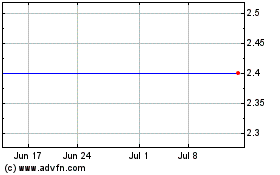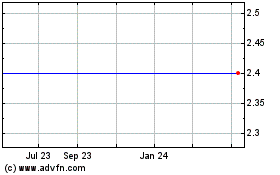Ruby Tuesday: Healthcare Law A Factor In Fast-Casual Foray
October 07 2010 - 4:26PM
Dow Jones News
Ruby Tuesday Inc.'s (RT) plan to operate other brands, including
a competitor to Chipotle Mexican Grill Inc. (CMG) in the rapidly
growing fast-casual space, comes as the restaurant company faces
waning growth for its namesake brand as well higher costs mainly
due to changes to the healthcare law.
Ruby Tuesday's founder and Chief Executive Samuel "Sandy" Beall
said in an interview Thursday that the prospect of higher labor
costs was "definitely a factor" in the company's recent licensing
agreement to open and operate up to 200 Lime Fresh Mexican Grill
locations over the next decade.
Lime Fresh, currently with seven locations in Florida, operates
fast-casual restaurants, a format similar to Chipotle and Panera
Bread Co. (PNRA) that offers meals at higher prices than fast food
chains but without some of the costs, like table service, of a
full-service restaurants.
"It's a little simpler of an operation when it comes to
healthcare -- Obamacare -- which could be devastating for the
industry," Beall said of Lime Fresh. Each Lime Fresh location may
have about 20 full-time employees, compared with 60 to 70 at a
typical Ruby Tuesday restaurant.
The concerns highlight how restaurants are looking to head off
higher costs from new health care requirements -- most of which
don't go into effect until 2014 -- by finding ways to make do with
fewer employees. The principal concerns for restaurants are
stipulations that require employers to provide a minimum amount of
medical coverage to employees or face penalties. The amount of the
coverage required has yet to be defined.
Lime Fresh also offers Ruby Tuesday and its investors exposure
to the fast-casual space, a segment of the restaurant industry that
has been growing strongly as it attracts a younger demographic. The
bar-and-grill segment, where Ruby Tuesday competes with DineEquity
Inc.'s (DIN) Applebee's Neighborhood Grill & Bar and Brinker
International Inc.'s (EAT) Chili's Grill & Bar, which have
struggled in part because they opened more stores than demand could
support.
"There's less opportunity to grow our primary brand yet we have
all this free cash flow," Beall said. "Therefore, you have to find
some new vehicles for growth."
Ruby Tuesday plans to open the Lime Fresh stores over the next
five to 10 years under a pact with the brand's owner, Beall said.
They'll be operated under a licensing agreement, with Ruby Tuesday
paying Lime Fresh's owner 2% of sales.
Ruby Tuesday also plans to convert some of its underperforming
Ruby Tuesday locations to the barbecue chain Jim 'N Nick's Bar-B-Q;
the higher-end casual-dining chain Truffles; or to a seafood chain
currently under development.
"Ruby's is becoming a story stock with the potential to generate
some awfully impressive returns but there's a lot of 'ifs' to be
answered," Morgan Keegan analyst Robert Derrington said in an
interview. "The market's going to take a wait and see
approach."
The development plans are part of Ruby Tuesday's long-term
strategy after the company staged a turnaround over the past two
years by offering discounts to win back customers. The company has
also paid down debt and closed money-losing stores, helping to
boost the stock above $12 recently from under $1 in early 2009. On
Wednesday, the company said its fiscal first-quarter profit doubled
from last year.
Plans for growing sales include getting more brunch and bar
sales, as well as a new menu. Ruby Tuesday also recently started
working with consultants dunnhumby, which has helped develop
customer loyalty programs at Panera and supermarket chain Kroger
Co. (KR).
-By Paul Ziobro, Dow Jones Newswires; 212-416-2194;
paul.ziobro@dowjones.com
Ruby Tuesday, Inc. (NYSE:RT)
Historical Stock Chart
From Jun 2024 to Jul 2024

Ruby Tuesday, Inc. (NYSE:RT)
Historical Stock Chart
From Jul 2023 to Jul 2024
